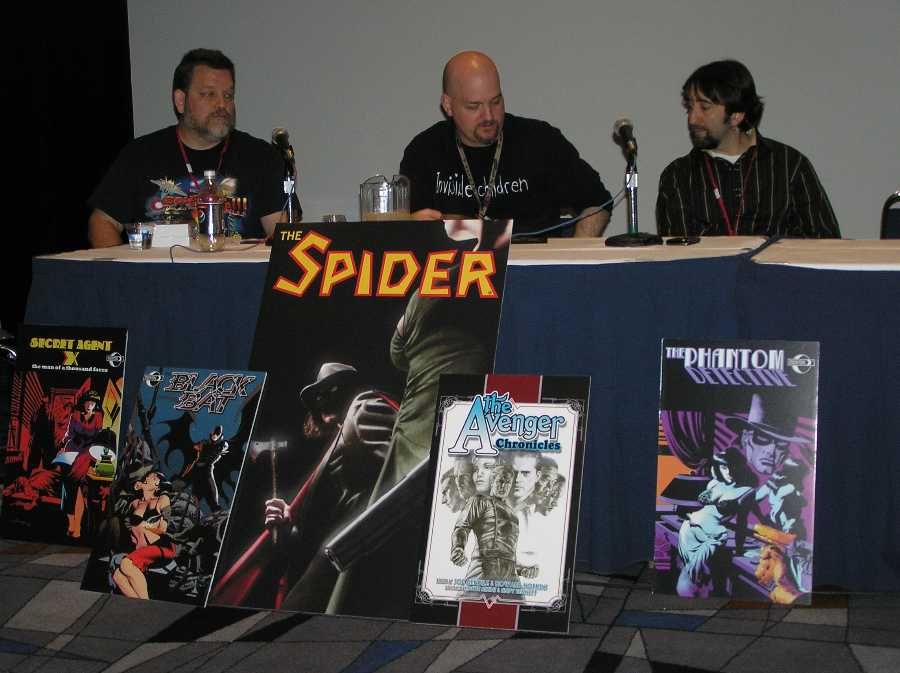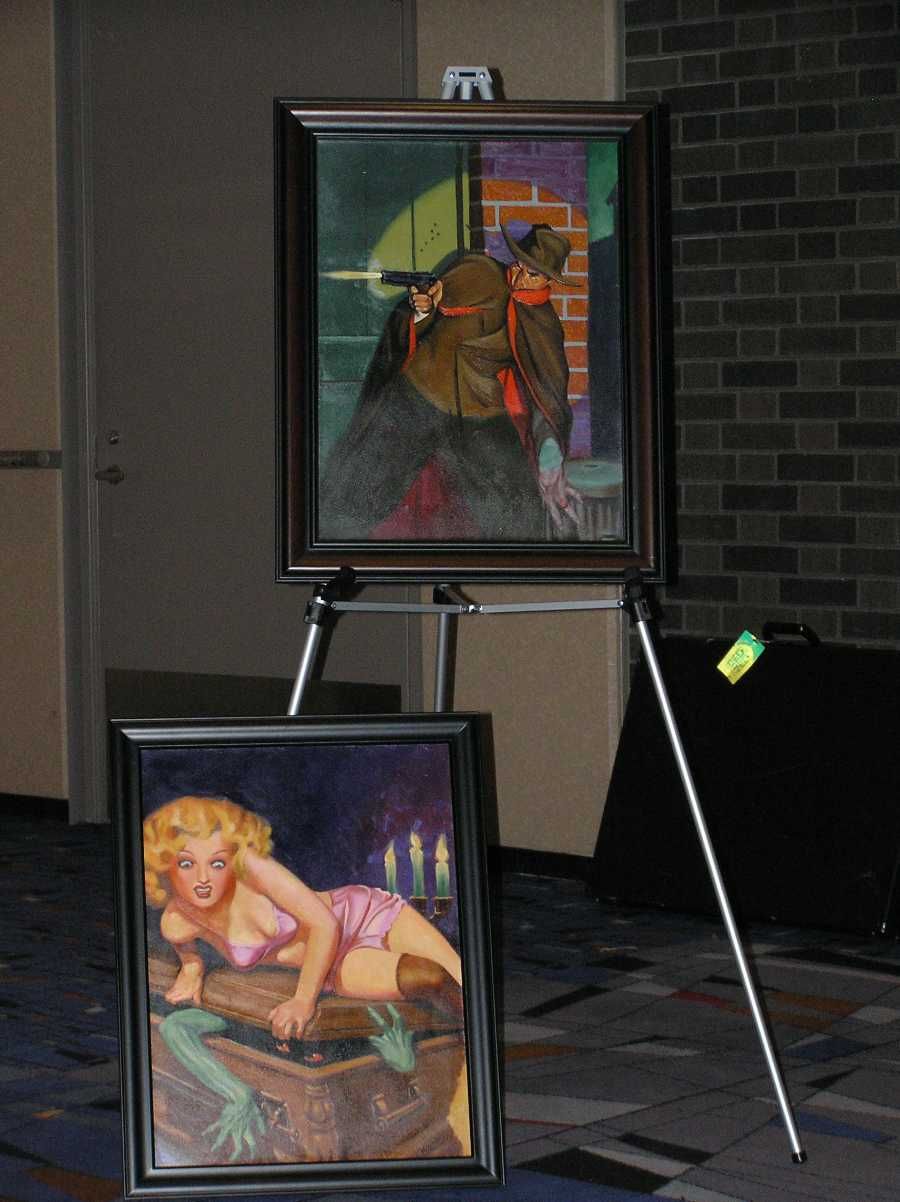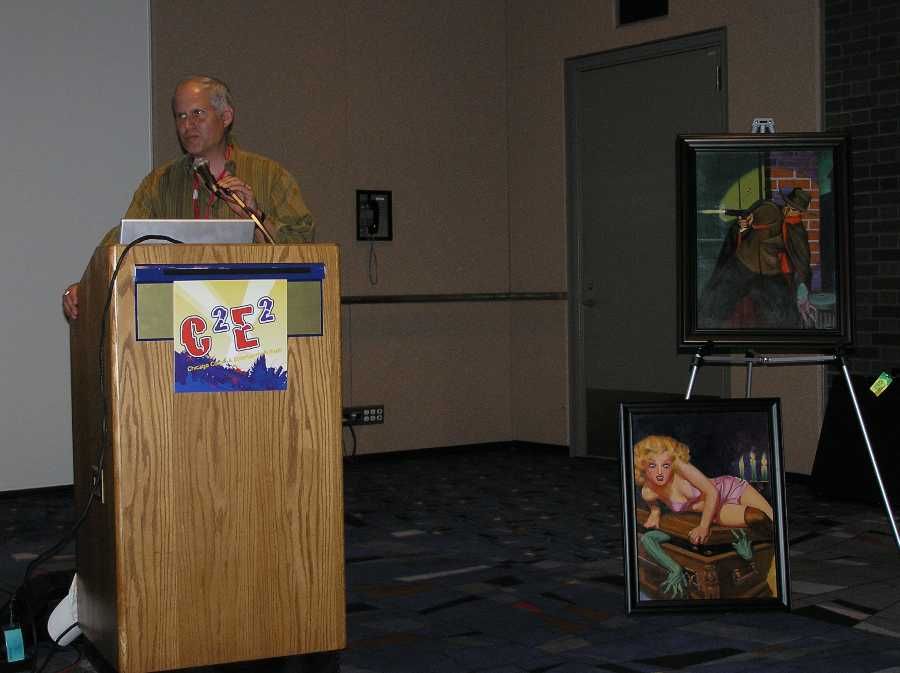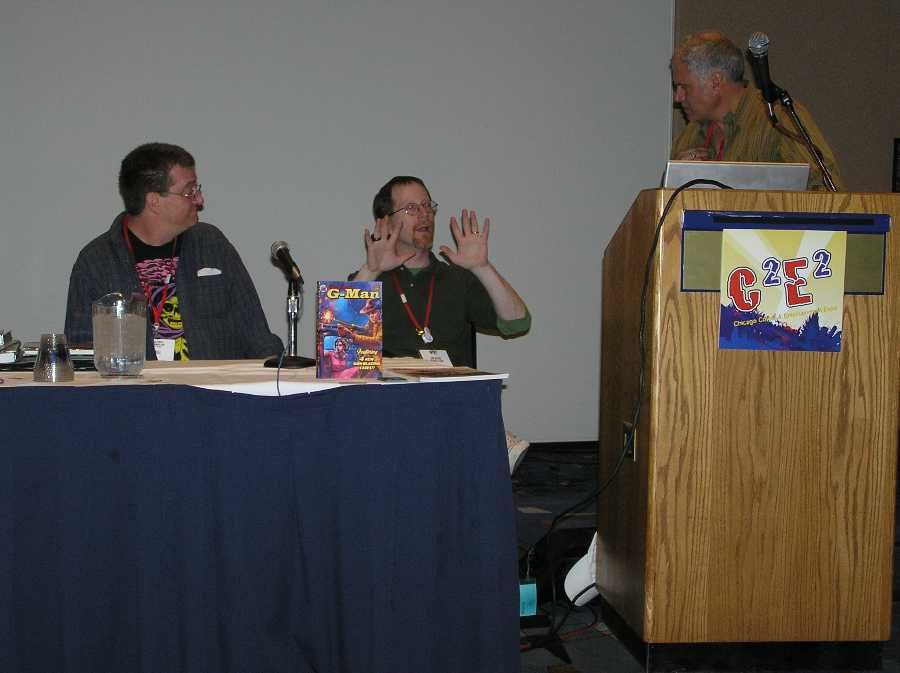Since it's exactly what we talk about here at Gorillas Riding Dinosaurs (now back on Wednesdays), I figured it would be appropriate to hold off talking about C2E2's Pulp Fiction panel until now. I thought I'd also be able to squeeze Moonstone's panel into this post as well, but that would make it way too long, so I'll save it for next week. The Pulp panel was moderated by Ed Catto, Licensing Agent for Captain Action Enterprises. The members of the panel were Jim Beard (Marvel.com), BC Bell (Dan Fowler: G-Man), illustrator Tom Gianni, Joe Gentile (Moonstone Books), Mike Bullock (The Phantom), and Wayne Reinagel (Pulp Heroes), with Brian Azzarello (DC's First Wave) joining later.
Catto opened the discussion by asking why Pulp is still popular and - more specifically - why it's currently making a strong comeback. Gianni's response was simply that Pulp stories are fun, but Bullock added that many readers today are yearning for a simpler time when problems were more easily solved. That's a fascinating response to me as someone who believes that healthy fantasies can be a strong deterrent to inappropriate behavior, rather than provoking it. I love the implication in Bullock's answer that society - while working hard at becoming more peaceful - still fantasizes about solving problems with violence, possibly as a way of channeling aggression into appropriate outlets. That makes a lot of sense to me.
Catto next asked about genres, particularly which the panelists thought were the truest embodiment of Pulp. Bell noted that Gangster stories were the biggest in Pulp's heyday, with Westerns also being very popular. Gentile offered Heroic fiction as the definitive Pulp genre and Beard added that - Doc Savage notwithstanding - street level Pulp is best. The conversation then turned to personal favorites with Air and Jungle Pulp getting mentions.
Old vs New, creating Modern Pulp, and the endurance of the genre after the break.
The conversation then turned to preferences between old Pulp stories and new versions. Bell said that it' a 50-50 split for him. While he enjoys discovering old characters like Captain Satan, there's a lot of great new stuff too. Bullock agreed, saying that as long as it's good it's worth reading. Gentile added that he likes new stories with the old characters because there's not enough of the old stories to read.
At that point, Beard wondered aloud if the old writers would ever have imagined that Pulp would be so enduring. Bullock doubted it. "They were just happy to get paid," he said. Gianni agreed and said that it was the same with painters, leading into several panelists sharing horror stories about the disposability of old Pulp paintings. Like auctions where no one bid or stacks of paintings left on the sidewalk for passers-by to take.
An audience member then asked how the panelists all got into Pulp. Gianni talked about Jim Steranko's contagious love for it while Reinagel and Bell credited reprints of the old stories. Beard said that his dad was a big Shadow fan and that that and DC's revival of Pulp characters in the '70s were responsible for his affection.
Talking about ways of introducing new audiences to these characters, Catto asked Gentile about the Doc Savage radio scripts that Moonstone recently reprinted. Gentile gave a quick history of the short-lived radio show, mentioning that the 15-minute format kept the stories simple, but exciting. Some of the episodes - all written by Doc Savage's creator Lester Dent - were adaptations of Dent's stories, but there were some original ones as well.
Referring back to the earlier question about old vs new Pulp, another audience member asked how writers attempt to give a classic feel to Pulp adventures set in modern times. Bell wasn't sure that it's possible, stating that that's why he sets his adventures in the '30s and '40s. Bullock disagreed though, citing his own Death Angel stories as an example. One of the staples of Pulp adventures, he said, was all the fringe science. There's still room for updated versions of that in modern Pulp and he's making sure to infuse Death Angel with it.
In a case of perfect timing, Brian Azzarello showed up right then and was able to talk about his own updating of classic concepts in modern times. Modern stories work, he said, because Pulp is an attitude. It's about the times, not of the times. He also differentiated between it and Science Fiction, saying that Pulp needs to be believable.
Catto asked specifically about Doc Savage and what Azzarello's decided to tweak and keep about him. Azzarello's response was that Doc's relationship with his dad needed tweaking, especially considering his father's manipulation of Doc as child to turn him into the superhuman he's become. What definitely needed keeping though, was Doc's heroism.
Azzarello also tweaked the way race is used in the series. The idea of six White guys fighting People of Color every adventure doesn't hold up well anymore, so Azzarello made Doc multi-ethnic. He wasn't allowed by Doc's owners to change the races of the Fabulous Five however.
This discussion led an audience member to ask how much you can tweak race and gender in modern Pulp. While Gianni offered the Samuel L Jackson version of Nick Fury as an example of a successful tweak - and Azzarello made clear that he would've loved to have made Doc's five companions more diverse - some concepts, Azzarello said, like the Femme Fatale, need to be left intact.
Catto asked if 100 Bullets was an example of modern pulp. Smiling, Azzarello said that sure it was, if that gets more people to buy it. But he quickly clarified that 100 Bullets is more Crime fiction than Pulp. Pulp needs heroes.
When asked by the audience about the temptation to "dirty up" the heroes, Azzarello replied that heroes do need something morally questionable to fight. They always have, but the rules about portraying that immorality have grown much more relaxed in modern times. In comparison, that makes the old stuff look "naïve," but as Gianni and Bell pointed out, characters like the Shadow and the Spider with their psychotic laughs and bloodthirstiness were quite dark even in their times.
The discussion transitioned into the endurance of Pulp and Reinagel expressed optimism. "The classics endure," he said, citing the Three Musketeers, Frankenstein, and Conan as examples. Gianni agreed and offered derivative characters like Indiana Jones as proof. As long as Hollywood needs new ideas, Azzarello observed, Pulp characters will stay in the public consciousness.
Beard was skeptical though. "We can kill it," he said, suggesting that it's the responsibility of Pulp lovers to pass that love to future generations.
Azzarello strongly disagreed. The characters, he said, are engraved in our culture and he didn't need an older person to introduce him to them. Bullock supported that idea, revealing that he discovered Pulps in a bookstore without help from the previous generation. They're like Greek mythology, he said. Doc Savage is American mythology. A representative from retro accessories, apparel, and home décor vendor Retro-A-Go-Go was in the audience (and sort of an informal sponsor of the panel) and brought up the iconic nature of Bettie Page as further evidence. Another audience member wondered if William Shakespeare wasn't really a Pulp writer at heart. A couple of panel members saw merit in that description of him.
Catto then asked about popular modern-day Pulp. Bullock mentioned Fringe, Gianni offered Dexter, and Catto himself thought of Lost. Bell recommended Human Target to the enthusiastic approval of the other panelists and Reinagel suggested derivations like Indiana Jones and Tomb Raider.
It's obvious that Pulp is alive and well and experiencing a resurgence in popularity. From grassroots efforts like Ron Fortier's Airship 27 to Moonstone's expanding line of Pulp comics and prose anthologies (see next week's article) to DC's First Wave universe, Pulp is more popular than it's been in decades. And as Hollywood looks for properties to compete with Marvel and DC's superheroes, we can expect Pulp to become more widely embraced still. Which reminds me that I just got the Sherlock Holmes DVD and my wife has been itching to see it.




